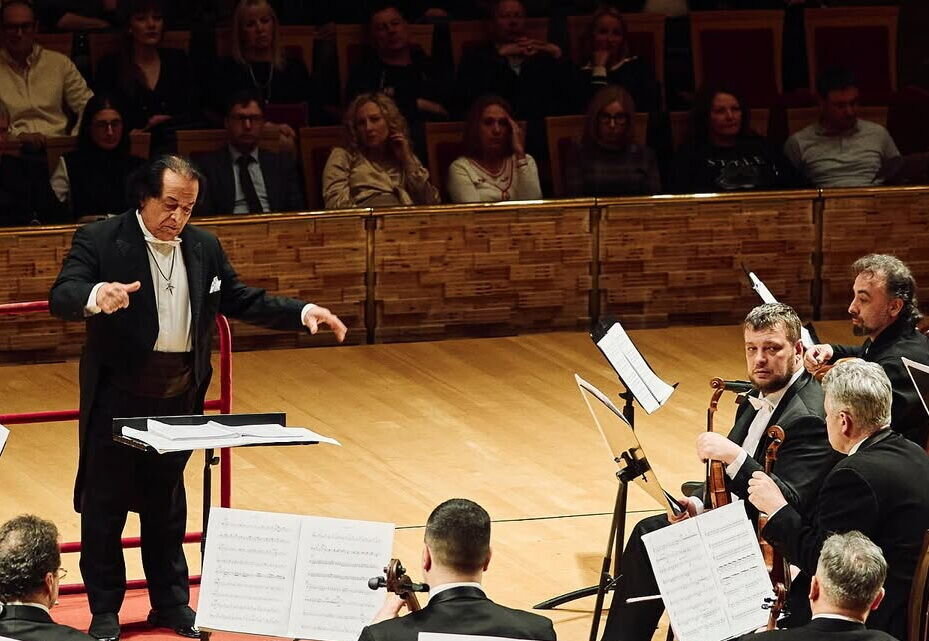Tehran’s famous Iranian composer and conductor Ali (Alexander) Rabari will perform “Persian, Two Taal Concertos” for the second time in June at the world-famous Marinsky Opera and Concert Hall in St. Petersburg, Russia.
The performance, composed and delivered by Rabari, is accompanied by Iranian tar soloists Aidin Oljanasab and Mahsa Karatian, along with the Marinsky Orchestra.
Symphonic Poem No. 8 will be performing from the “My Mother Persia” album, composed by Rahbari on June 19th, IRNA reported.
“Persian, Two-Tar Concerto” was first performed at the same venue on March 21st and was warmly welcomed by the audience.
Rahbari’s “My Mother Persia” is a cycle of symphony poems filled with rich melodies, rhythms and improvisations of the traditional Persian music that he is deeply familiar with as both a composer and conductor.
In July 2022, Rabari made his debut at the Marinsky Theatre, and since then he has been a regular on the Marinsky stage.
Aidin Olyanassab, 49, began his musical journey at the age of nine by bringing up TAR. He received basic training under respected leaders such as Jamal Samavati, Zeydollah Tolu’i, Arshad Tahmasbi, Hossein Alizadeh and Dariush Talai, and mastered both preliminary and advanced traditional repertoire.
In 1999, following the release of his Tar Technique album “Dar Gozar…” (in the pass…), he expanded his musical expertise by studying classical piano at the Tehran Music Conservatory with Catlin Arefi, Tengiz Shavlokhashvili and Haynoush Macarian. His music education continued under the guidance of Sofia Mikaiyan and Sergei Sarajian at Comitas State University in Yerevan.
After returning to Iran, Oljanasab contributed to the music education of the Art University and Gilan University in Tehran, teaching specialized courses in tar, piano, orchestration and ensemble performances. His creative output includes the Tar Technique albums “Dar Gozar…” (1999), “Sargashteh” (Confused) (2013), and “Rad-e Pa” (Footprint) (2018), as well as a collection of vocal and orchestral works.
Since 2014 he has performed his work in Iran and led the Uranus group, and in 2019 he founded the Uranus Specialist Music Academy, promoting his commitment to the development and spread of traditional Persian music.
Mahsa Kharatian, 24, is a skilled tar player who bridges the rich heritage of Persian classical music and contemporary innovation. A graduate of the Tehran Academy of Music, she is currently conducting research at the Iranian University of Art in Tehran.
Under the guidance of Aidin Olyanassab and Hamid Khabbazi, inspired by Maestro Rahbari, she developed a unique and expressive approach to tar.
At age 5, Rahbari, 76, embarked on his musical journey and learned to play the violin. He graduated from the Vienna Academy of Music and Arts in 1971 and specialised in composition under the guidance of Gottfried von Eenem and completed his conducting studies led by Hans Swarovski in 1974. He is a admirer of international command competitions, securing a gold medal in Bessanson, France, and a silver medal in Geneva (1978).
He has conducted over 120 orchestras around the world, including orchestra Della Svitzela Romanda, Tonhal Orchestra Zurich, Rotterdam Philharmonic Orchestra, Orchestra National de France, French chamber orchestra, Gewandaus Orchestra Leipzig, Stockholm Philharmonic Sinfestra, Pluguestra, Pluguestra, Pluguestra, Pluguestra, Pluguestra, Pluguestra, Pluguestra and Pluguestra.
Rahbari received the Dvorak medal in 1985 for his collaboration with the ensemble, serving as the main guest conductor of the Czech Philharmonic Orchestra, leading the Philharmonic Orchestra in Belgrade, Belgian radio and television orchestra (which became a major conductor from 1988 to 1996 to 1988).
He was the main conductor of the Zagreb Philharmonic Orchestra and the master Diplaga Chamber Orchestra. From 2000 to 2004 he was the leading conductor and music director of the Spanish Malaga Symphony Orchestra.
In 1997, Rabari gathered 60 Iranian musicians from Austria, Belgium, France, Germany, the Netherlands, Spain, Sweden, Switzerland and the United States to form the Persian International Philharmonic Orchestra in Bregenz, Austria. And his own violin concerto, “No Kahn,” was later awarded by the Vienna Academy of Music and Arts.
He released over 250 compact discs, and recordings of the opera by Verdi and Puccini gained certain popularity under his direction.
SS/SAB

